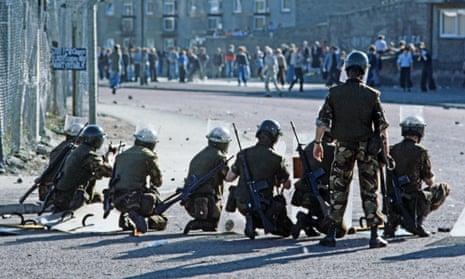No member of the British security forces has been tried and convicted since the Good Friday agreement of 1998 in connection with state killings during the Troubles, a human rights organisation has found.
In a comprehensive report into human rights violations during the conflict from 1969, the Committee on the Administration of Justice said it was unable to locate a single case where a police officer, soldier or MI5 agent had been sentenced over state crimes since the agreement.
Echoing complaints from the victims of violence such as the Bloody Sunday massacre of 1972, the CAJ report noted that even though David Cameron and the government had apologised for the atrocity, not a single soldier has been charged with killing 13 civilians in Derry.
Launching its 144-page report in Belfast the human rights group, which has monitored abuses in Northern Ireland for several decades, also accused police and security officials of obstructing subsequent inquiries and investigations into deaths caused by state forces.
“Many investigations and court proceedings into pre-1998 human rights violations have faced recurrent problems of obstruction and non-cooperation from state agencies and former personnel.
“This has included concealment, non-cooperation, withholding and delaying the disclosure of records, with repeated examples of material being put beyond the reach of investigators, going ‘missing’, being destroyed, or being overly redacted,” CAJ concluded.
In certain historic inquiries, CAJ said there had been “recurring questions of conflicts of interest regarding personnel in key positions in the investigative chain. This includes rehired RUC (Royal Ulster Constabulary) officers in key roles responsible for disclosure to external legacy investigations.”
The report also claims governments and security forces are hiding behind “national security” to conceal vital intelligence material relating to certain crimes, including those committed by paramilitaries who were secret agents of the state.
On the question of the use of agents within terror groups and crimes they committed, CAJ said the doctrine of “neither confirm nor deny” was being used to withhold information.
For both informers working for the state and British soldiers, the report states: “There is evidence that at times during the conflict a level of immunity was afforded to soldiers and informants who could otherwise have faced prosecution.”
It adds: “The evidence points to a common purpose between the UK government and elements within the security establishment to prevent access to the truth and maintain a cover of impunity for state agents.”
The report also criticises the fact that MI5, which now has the primary role in counter-terrorist operations in the region, is not accountable to local politicians or public bodies, unlike the Police Service of Northern Ireland.
“The security service MI5 has a blanket exemption from disclosing information under freedom of information legislation,” the report said.

Comments (…)
Sign in or create your Guardian account to join the discussion